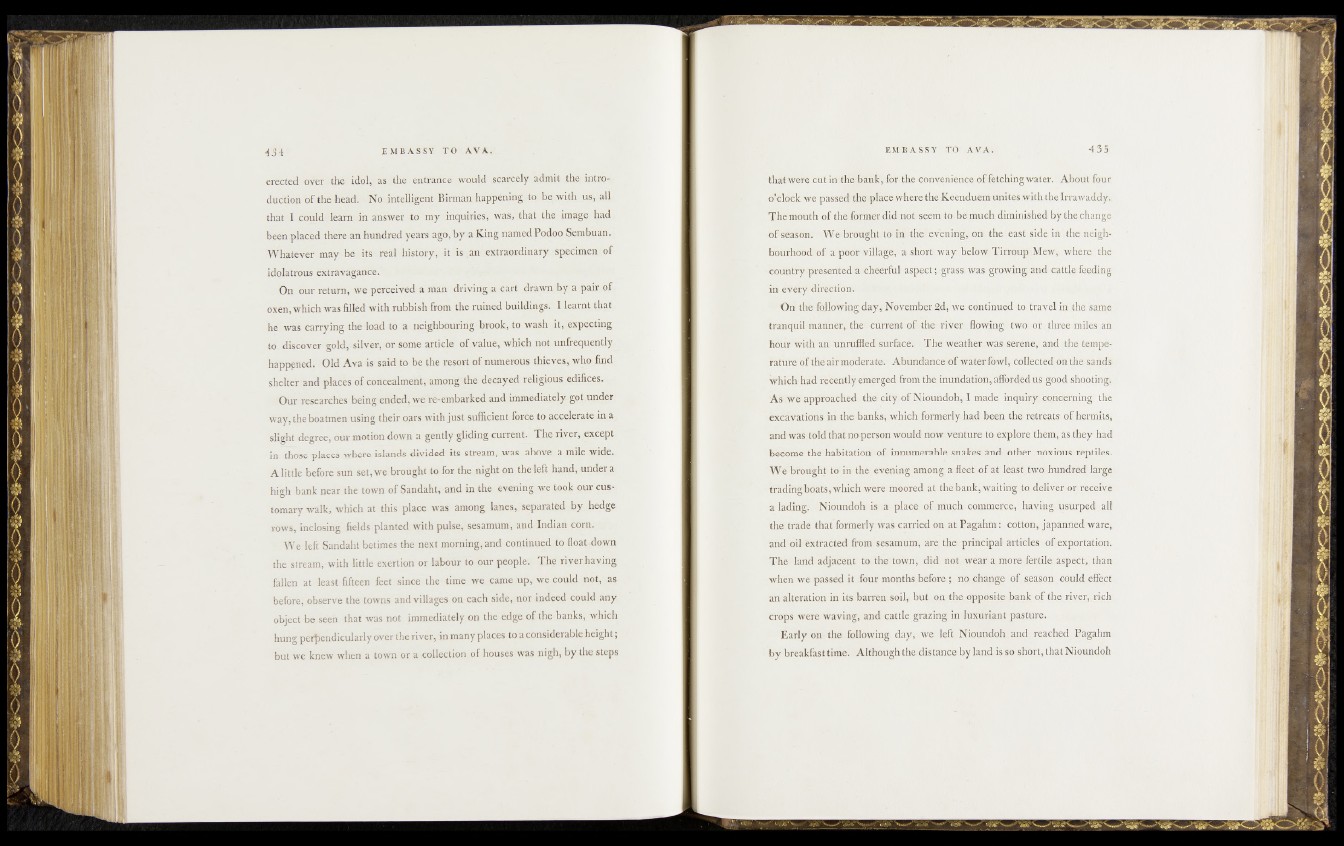
erected dyer the idol, as.the entrance' would scarcely admit intro-»-
duction of the-head:' Nnsintelligeni Birman happèning AO;'he-with .US',, all
that.tï could.learn in answer to my inquiries, was, that the- image h a d ,
been placed there.an (hundred years ago, by a King named Bqj|$o Sembuan. |
W h a te te f may be its real Mstosy$. it-is aii .extraordinary sp|ei^,etv>j pf'
idolatrous extravagance. .
On U p return, we perceived a. man driving a cart drawn by a pair, of
Oxen; which was filled with rubbish from the ruined buildings, I learnt that
hé was carrying the load to a neighbouring brook, to wash it,, expecting
to discover gold,-silver, o r some article oLvalue,-which not unfrequ.eii.tl'y^
happened* Old Ava is said to be the » s o rt of numerous thieves,
shelter and places of concealment, amongï-thé decayed religious; edifices.-
Our researches being ended, we re-embarked ahd.immpdiatelygpjtjunder
way, the boatmen using their oars with just sufficient force tcg^Geleratejimaj
slight degree, our motion down a gently gliding current- The-ri^er^-except
in those places where islands divided" its stream, waS .aÛ<t?§'j mMS-jKjdÇv
A little before sun set, we brought to for the night on- the4eftjh^dhnhd.eS a
high bank near the town of Sandaht, and in the evening we took our customary
walk, which at this place was among lanes, separated by hedge
rows, inclosing fields planted with pulse, sesamum, and Indian corn. ■
We left Sandaht betimes the next morning, and continued to float .down
the stream, with little exertion or labour to our people. The river having
fallen at least fifteen feet since the time we came up, we could not, as
before, observe the towns and villages on each side, nor indeed could any
object be seen that was not immediately on the edge of the banks, which
hung perpendicularly over the river, in many places to a considerable height ;
but we knew when a town or a collection of houses was nigh, by the steps
thatweite ciAlg,’t>laiiba<hkV' ffijkth'e .ebhyetMh'e^tofrfetching water. About four
o^lbskl^Spa'sSed*thef#ft%.where%he;ReeTid!uemi.unites witfruhelrrawaddyv,
Thdfflipiarh obthc- Imrni i (hdlrijiijhstcjiiVOilidmuc.il diminished by the change.
bfi&ea'Soh vyVc'hiiolights to li^t'flc^e^ triMigSrpu tliefeepshside in ,the;neigh-
bonihood ot i pooi?,villfige^,»slto'sV^S'v|IldbwjrI nisoiipiMeyjt, where the
cMimty'presented‘^ h d e rftil^ p c t.igm s ^ a s t'gw v v ia g ^ n d eaftlp, feeding
fi® ©s^y^'ffireeta^mi' ^
1 O n she, lolloping d u ,i>No% „nrhcuAHw o? bontiiiuJd to-iray'dl tp$he, same*
tra nquibmainiOEf fheW currenti efirthe rive%'flpMngfh^wi(j&Qj>4^J?bsm!i,tes an
houtfwitli a'hthmruffied surface!,. f#hi*woit*buiSJW^s!jstj,tiA *ayili,ih*. reinpe-
Tature'bf thermit moderate *’jA‘l^nd.ffite|ol vwaterilowl wllecCdlloli thcS'S.ahds
whichhad ieccntly.emcrgt(l'fi()m tl*i4iriiniMaiibri^fUjdijblft <?y,°.d shd<y.jri A”
'As wetapf¥oacfaed'the.GifyJo^^|puSd^B^ii^.d^Jnqu^^K,ree'niung th’c
excavations, in the banks, which formerly,liad.bcLU tlicjioftCaP» otrffu fnitsj
and was-told that no person would nowiventiirc log0>xpjo^ohliuiiytas thih^had
become' the habitation of inuumbiahle snakes and othti,,Tio«Atusi leptilts-.
We brought todffithe:.evening 'among...ajfleet <fiiJ$lc'a^t\wi* hundied iaige
trading boats, which were moored at the bank. wailiiigitq:(ldi^wqiiiecti\e
.adadiii'gV "' Nioundoh is a; plaeei oforiiucl^mnutecc gvjhaA in», usurped all
the.trade that formerly wa&carriedon at P agahm:. cptto^Apapnedjware,
and oilhktracted from sestpiilmy are (lie .pnihtipal ar,tu-l^^o'^qxppflauijih
Th e land adjacent to the town, did* not wcariajtnipr^sip^l^'^pccL,, tfl m
■When we passed it lour months)before ; noicjfcanue o^;season.,u iu ld ^ lu -h
an alteration in its barren soil, but* on the^opposi.tc ,bayk ol t h e s e s ,-iidi.
crops were waving, and cattle grazing, miluxuriant pasture. <
Early on the following day, we left* Niouiidoh, andJffieUoh^hj^agabm
by breakfast time. Although the distance b) land is so shot t, that N lqjmdqh